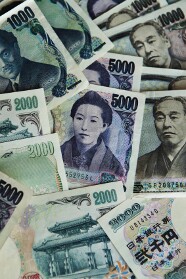
The Japanese yen is strengthening against major currency rivals on Thursday, despite a myriad of bearish outlooks by both the federal government and international bodies. A string of weak economic data also could not affect the yen toward the end of the trading week as investors continued to pour into the traditional safe-haven asset amid global uncertainty due to the Wuhan coronavirus outbreak.
Earlier this week, the January Eco Watchers Outlook survey plunged from 45.5 to 41.8, and it fell short of the median estimate of 47.1. The Eco Watchers survey for current conditions did improve from 39.7 in December to 41.9 in January, and it beat market forecasts of 40.5.
Last month, machine tool orders plunged 35.6% year-over-year, down from the 33.5% drop in December, according to the Japan Machine Tool Builders Association (JMTBA).
The producer price index (PPI) edged up from 0.1% in December to 0.2% in January, lifting the 12-month rate to 1.7%.
Earlier this week, the International Monetary Fund (IMF) warned that the nationâs economy will take a significant hit due to a reduction in tourism and trade. Researchers sounded the alarm that the spread of the coronavirus will impact a whole host of Japanese industries, from retail to manufacturing, especially if the outbreak extends into the summer. The IMF did not provide any estimates on how much the virus could affect growth.
Paul Cashin, the IMF’s mission chief for Japan, told Reuters:
The spread of coronavirus poses an emerging downside risk to Japan’s economy, although the economic impact will depend on the extent of the spread of the disease and policy responses.
If prolonged and widespread, this would likely affect Japan’s tourism and retail activities through a decline in tourist arrivals and spending from China and elsewhere.
This is bad news for a nation that is set to host the 2020 Olympics. Prime Minister Shinzo Abe recently established a task force to look into the diseaseâs effects on the major sporting event and what could be done to mitigate its threat.
In a separate report, the IMF is further recommending that Tokyo regularly raise the national sales tax to help fund the countryâs swelling social security costs. Without any fiscal reforms, the IMF projects that Japanâs public debt could be more than double the size of the economy in the next decade. In October, the government increased the consumption levy from 8% to 10% to begin tackling its finances, a move that sent consumer spending crashing.
Overall, it expects growth to be 0.7% this year.
The USD/JPY currency pair tumbled 0.26% to 109.81, from an opening of 110.09, at 18:54 GMT on Thursday. The EUR/JPY fell 0.52% to 119.09, from an opening of 119.73.
If you have any questions, comments, or opinions regarding the Japanese Yen, feel free to post them using the commentary form below.